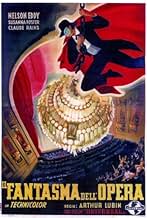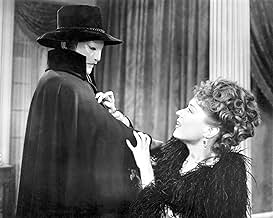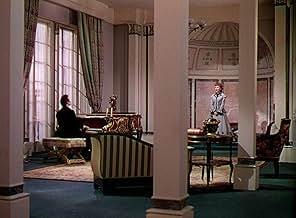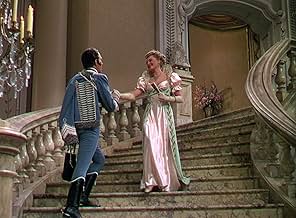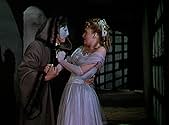Filme estrelado por Claude Rains como o mascarado fantasma da Ópera de Paris, um compositor enlouquecido que planeja fazer de uma linda jovem soprano a estrela da companhia de ópera e saciar... Ler tudoFilme estrelado por Claude Rains como o mascarado fantasma da Ópera de Paris, um compositor enlouquecido que planeja fazer de uma linda jovem soprano a estrela da companhia de ópera e saciar sua vingança contra os que roubaram sua música.Filme estrelado por Claude Rains como o mascarado fantasma da Ópera de Paris, um compositor enlouquecido que planeja fazer de uma linda jovem soprano a estrela da companhia de ópera e saciar sua vingança contra os que roubaram sua música.
- Direção
- Roteiristas
- Artistas
- Ganhou 2 Oscars
- 3 vitórias e 5 indicações no total
- Landlady
- (as Kate Lawson)
Avaliações em destaque
Although several proposals were considered (including one intended to feature Deanna Durbin, who despised the idea and derailed the project with a flat refusal), it wasn't until 1943 that a remake reached the screen. And when it did, it was an eye-popping Technicolor extravaganza, all talking, all singing, and dancing. The Phantom had gone musical.
In many respects this version of PHANTOM anticipates the popular Andrew Lloyd Webber stage musical, for whereas the Chaney version presented the Phantom as a truly sinister entity, this adaptation presents the character as one more sinned against than sinning--an idea that would color almost every later adaptation, and Webber's most particularly so. But it also shifts the focus of the story away from the title character, who is here really more of a supporting character than anything else. The focus is on Paris Opera star Christine Dae, played by Susanna Foster. In this version Christine is not only adored by the Phantom; she is also romantically pursued by two suitors who put aside their differences to protect her.
Directed by Universal workhorse Arthur Lubin, this version is truly eye-popping as only a 1940s Technicolor spectacular could be: the color is intensely brilliant, and Lubin makes the most of it by focusing most of his camera-time on the stage of the Paris Opera itself and splashing one operatic performance after another throughout the film. But in terms of actual story interest, the film is only so-so. Susanna Foster had a great singing voice, but she did not have a memorable screen presence, and while the supporting cast (which includes Nelson Eddy, Edgar Barrier, Leo Carrillo, and Jane Farrar) is solid enough they lack excitement. And the pace of the film often seems a bit slow, sometimes to the point of clunkiness.
The saving grace of the film--in addition to the aforementioned photography, which won an Oscar--is Claude Rains. A great artist, Rains did not make the mistake of copying Chaney, and although the script robs the Phantom of his most fearsome aspects, Rains fills the role with subtle menace that is wonderful to behold, completely transcending the film's slow pace, the lackluster script, and "sanitized for your protection" tone so typical of Universal Studios in the 1940s. Unless you're a die-hard Phantom fan you're likely to be unimpressed.
Gary F. Taylor, aka GFT, Amazon Reviewer
The DVD release is a fantastic transfer from an original old Technicolor master.
Você sabia?
- CuriosidadesThe original script revealed Claudin to be Christine's father, who abandoned her and her mother in order to pursue a musical career. When this was excised from the final film, it left Claudin's obsession with Christine unexplained.
- Erros de gravaçãoWhen Christine takes the mask off from Phantom's face, we see that his scar reaches the low area of his right cheek, even the right eyelid is slightly fallen. But before that during the entire film, we never see a single mark of the scar on the uncovered area of the Phantom's face, not even the fallen eyelid through the mask.
- Citações
[Christine has left Raoul and Anatole in her dressing room while she greets a crowd of admirers]
Raoul D'Aubert: Would you join me for a bit of supper at the Cafe de l'Opera?
Anatole Garron: With pleasure, monsieur.
Raoul D'Aubert: Think we can get through this crowd?
Anatole Garron: Certainly. After all, who'd pay any attention to a baritone and a detective?
- ConexõesFeatured in Weirdo with Wadman: Phantom of the Opera (1964)
- Trilhas sonorasLULLABY OF THE BELLS
(uncredited)
Written by Edward Ward
Lyrics George Waggner
Sung by Susanna Foster and Nelson Eddy
Principais escolhas
- How long is Phantom of the Opera?Fornecido pela Alexa
Detalhes
- Data de lançamento
- País de origem
- Idioma
- Também conhecido como
- El fantasma de la ópera
- Locações de filme
- Empresa de produção
- Consulte mais créditos da empresa na IMDbPro
Bilheteria
- Orçamento
- US$ 1.500.000 (estimativa)
- Tempo de duração1 hora 32 minutos
- Mixagem de som
- Proporção
- 1.37 : 1
Contribua para esta página




